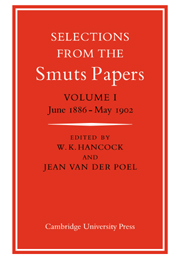2 - Cambridge
Published online by Cambridge University Press: 03 February 2010
Summary
In 1891 Smuts graduated from Victoria College, having taken the ‘mixed’ degree in science and literature of the University of the Cape of Good Hope and won a scholarship. In September of that year he left for England to read law at Christ's College, Cambridge; he was there until the summer of 1894. His academic achievements are listed in 35. Only one letter written by him during this period has been traced, but it is, biographically, a gem. Fortunately some letters written to him survive, notably from Professor Marais of Stellenbosch and one from F. W. Maitland. These provide information about his financial difficulties, his quality as a student, his intellectual interests.
The best guide, however, to the growth of Smuts's mind in his Cambridge years is a bundle of essays which he wrote mostly during the long vacations, and which have nothing to do with the tasks set by his tutors. Professor Marais's dismissal of law as ‘classified humbug’ roused Smuts to defend it in Law, a Liberal Study, published in the journal of his College in 1893. His awakened political consciousness led him to consider the bearing of language on the problems of his country in The Conditions of Future South African Literature—a tough subject at which he made several attempts; and here again he preached the gospel of white unity. The germ of his philosophical thought appears in an essay entitled On the application of some Physical Concepts to Biological Phenomena.
- Type
- Chapter
- Information
- Selections from the Smuts Papers , pp. 23 - 50Publisher: Cambridge University PressPrint publication year: 1966
- 1
- Cited by

